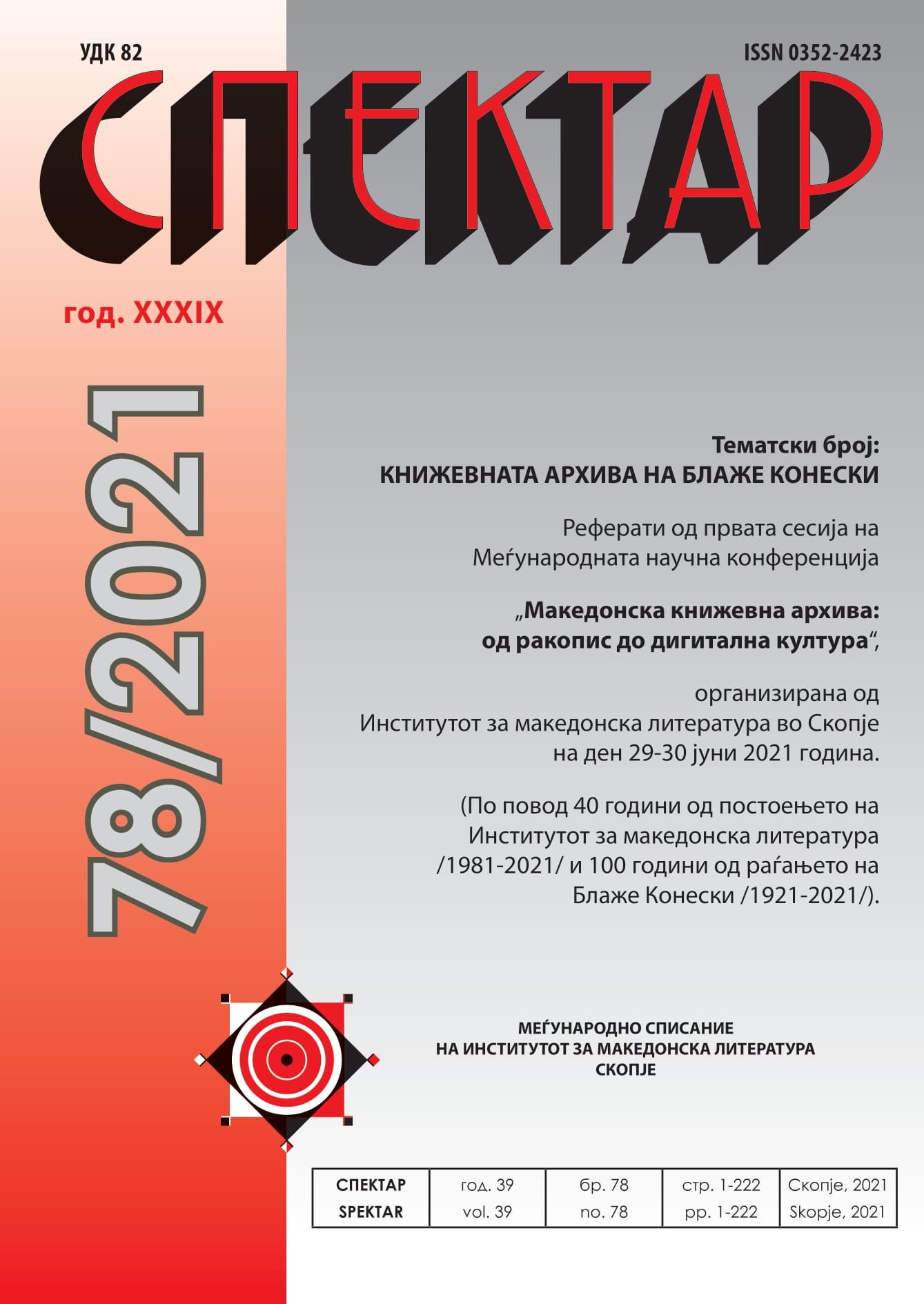КНИЖЕВНОТО НАСЛЕДСТВО КАКО СЕПРИСУТНОСТ ВО ТВОРЕШТВОТО НА БЛАЖЕ КОНЕСКИ И НА ВЕНКО АНДОНОВСКИ
LITERARY HERITAGE AS AN OMNIPRESENCE IN THE WORKS OF BLAZE KONESKI AND VENKO ANDONOVSKI
Author(s): Iskra Tasevska Hadji BoshkovaSubject(s): Comparative Study of Literature, Macedonian Literature
Published by: Институт за македонска литература
Keywords: cultural tradition; genre modulation; re-actualization; Blaze Koneski; Venko Andonovsk
Summary/Abstract: Literary and cultural heritage represents an unavoidable phenomenon that must be taken into account in literary inquiries. It is a very important aspect of the works written by Blaze Koneski and Venko Andonovski, since they enforce its true actualization. In the essays, Koneski underlines the specific efforts that Pejcinovic, Zinzifov, Prlicev and Cepenkov made, regarding the development of the Macedonian language and culture, and their work contributed to measuring the extent to which foreign impulses would be integrated in the authentic cultural process, which was not perceived as of lower degree or quality, in regard to the foreign context. Koneski analyses the artistic and cultural activity of Zinzifov, especially in terms of his poetic and narrative works, and makes it evident in his short story “Vineyard” from the eponymous story book (first published in 1955). Instead of Zinzivof’s well-thought and impregnated digressions, which he uses in order to reflect the contemporary circumstances, seen through his critical and publicist perspective, Koneski relies on the phenomenon called “feeling into” (Einfühlung), and by employing it, he elaborately describes the character, but also problematizes the nature of the story event. In the works of Andonovski, the active relationship with the tradition and its transformation (in the way Koneski actualized them) signifies a constant re-valorization of the inherited concepts. Andonovski dialogizes with Koneski’s works, especially in the story “Sun – God’s egg”, from the book Taming of the Bitch, and implicitly in the other stories as well. The title of this short story refers to one folklore genre, made apparent inBrothers Miladinov Anthology, and analyzed by Koneski in a separate essay. On the other hand, the dramatic text of Venko Andonovski (Riddled Souls) connects the events that happen in the home of the shoemaker Branko Popovic, prior to the bloodshed day in Kraguevac in 1941, with the symbolism of the divine justice and omnipresence, represented by the request of the young girl Verica, the author’s mother, to have a roll with the egg for breakfast. Her desire is transformed in terms of her father’s sacrifice, which can be interpreted as a sort of cosmogony, a rise of the new world that mythologically happens when the more powerful ones make a sacrifice for the good of the majority (e.g. the figures of Purusha and Prajapati in the Indian mythology). The dramatic situation puts under suspicion the black and white depiction of characters and culminates in priest Danilo’s sacrifice, who is a kind of true cultural hero, an individual able to grasp the essence of existence and save the humanity. That is the part where the agony of Christianity and the German rationalistic mind clash, and pose the question of the symbolic understanding of the world, seen as synchronicity and a coexistence of different time periods. By evoking the tradition, Koneski and Andonovski in a certain way cast a light on the meaning of the term “everyday phantastic”, which enables old things to be seen in a different manner, thus manifesting the freshness of the creational process.
Journal: Спектар
- Issue Year: 2021
- Issue No: 78
- Page Range: 159-171
- Page Count: 13
- Language: Macedonian

